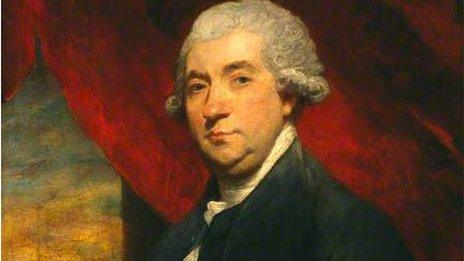James Boswell: The man who re-invented biography
- Published

Samuel Johnson is remembered as the absolute epitome of the distinguished "man of letters". But the key to his continuing influence could have its roots in a meeting with a young Ayrshire lawyer and diarist exactly 250 years ago.
James Boswell did not meet Dr Johnson, compiler of the first great English Dictionary and arbiter of literary taste, by chance.
The young Scot was "super-intelligent, had great literary taste and was very charming" so he obviously wanted to meet the stars of the day such as Johnson, says James Knox.
Mr Knox, who with his wife Caroline is the driving force behind the Boswell Book Festival, is seeking to revive the reputation of the Scot who is often just seen as a companion to his older English friend.
The 22-year-old Boswell was allowed by his father to travel to London after passing a law examination and sought out a meeting with the literary colossus Johnson through a publisher friend, which took place on 16 May 1763.
It was to become a close friendship, which lasted until Johnson's death in 1784.
On the 16 May 1791, Boswell published the Life of Johnson, a book which is widely regarded as the first modern biography.
"Previous to this biographies, such as they were, were idealised portraits of people such as military commanders and kings," says Mr Knox.
"What Boswell did was turn a great figure into flesh and blood.
"It was a warts-and-all biography of Johnson."
Mr Knox says Boswell's style was "very modern", giving a psychological insight into "what made Johnson tick".
One reason Boswell was able to capture such a complete and vivid portrait of Johnson was that the writing of the biography could be said to have started on the day they met.
Mr Knox says: "Boswell was note-taking the minute he met Johnson.
"So he had verbatim accounts of what Johnson ate, what he did, the way he spoke.
"He then puts in patches of verbatim dialogue as recorded in his diary."
Gordon Turnbull, editor of the Yale University editions of Boswell's papers, says the diaries are amazingly vivid.
He says: "The life was not exactly a flawless one and what he did, well ahead of the 20th century vogue for such things, was record his life with a remarkable candour.
"He set it all down, setting up quite an interesting calculus between him as a writer and you as a reader.
"You are enjoying what you are reading but you are also slightly wincing and cringing every now and again.
"He challenges you when you are reading him to think that you are better than he is. But you have to ask yourself, am I really?"
Telling details
Mr Turnbull adds: "There are other diarists and memoirists at the time but they are nothing like this.
"Nothing like that vividness, the immediacy, the sense of detail.
"That is the same skill that he brought to the biography of Johnson. The Flemish portrait as he called it, full of telling details."
Mr Knox adds: "Boswell's diaries are absolutely astonishing because they are so honest.
"He writes about sex, depression, drink, rows with his father, the drudgery of law, the great spectacle of life in London and in Edinburgh.
"It is slightly like reading Catcher in the Rye."
As well as being the first modern biographer and a prolific diarist, Boswell was the first celebrity interviewer, Mr Knox says.
He was a product of the Scottish Enlightenment, who studied at Glasgow University under Adam Smith and loved to meet the great thinkers of the day.
James Knox says: "He went to see the great French philosopher Rousseau, who tried to turn him away saying he was unwell and he could only spare a short time.
"Boz wrote 'I hate that phrase, short time' and he ended up chatting to him for six days.
"He really got to the heart of people and that's what all great biographers aspire to do today."
Mr Knox is running the Boswell Book Festival at the author's former home, Auchinleck House.
He says: "All the great contemporary biographies, whether they are aware of it or not, are writing in the shadow of Boswell in that they use the same techniques.
"They use eye witness accounts, study of texts, dialogue, physical description, researching from a host of different sources - both printed and verbal - he interviewed a mass of people, everyone who knew Johnson."
The Boswell Book Festival will play host to many modern biographers and writers, such as Jane Ridley, who has written Bertie about King Edward VII.
Mr Knox says: "She is so psychologically astute. It leaves no stone unturned.
"She writes about his sex life, his role as a king, his relationship with his mother and his father.
"It is absolutely the same approach as Boswell took."
The Boswell Book Festival takes place at Auchinleck House in Ayrshire from 17 to 19 May